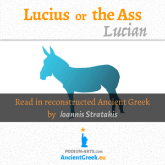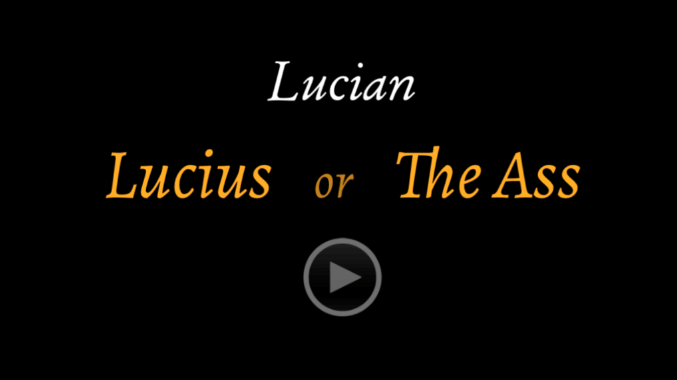• Lucius or The Ass •
• Lucian •

Duration: 1 hr 47 mins
Unabridged
Recorded: 2023
Price : $72
about Lucius or The Ass
"Lucius or The Ass" (Gr.: Λούκιος ἢ Ὄνος) is a work of fiction written by the ancient Greek writer Lucian in the 2nd century AD. The story follows the misadventures of Lucius, a young man who while travelling from Patras to the Thessalian city of Hypata for business, but being eager to experience love and magic, or, out of love for magic the magic of love... meets the servant Palaestra who eagerly teaches him a very practical love lesson. Though by an error of hershe is transformed into an ass! As an ass, Lucius is forced to endure the hardships and unexpected humiliations of life as a lower class animal.
Despite his new form, Lucius retains his human intelligence and wit, and he uses these traits to navigate his way through the various challenges he faces as an animal. Along the way, he encounters a variety of characters, including corrupt priests, greedy merchants, scheming thieves and a nasty young teaser, all of whom are satirized and lampooned by Lucian's sharp and humorous writing.
Through the story, Lucian explores themes of social hierarchy, human folly, and the corrupting influence of power. He also includes several moral lessons, such as the importance of honesty and humility, which are conveyed through the experiences of Lucius and the other characters.
Overall, "Lucius or The Ass" is a humorous and thought-provoking work that provides a unique perspective on ancient Greek society and culture. It is an excellent choice for those interested in learning more about this period of history, as well as for those who simply want to enjoy a classic work of literature.
You can follow the original text of “Lucius or The Ass” by (pseudo?) Lucian, online at the Bibliotheca Augustana. A translation in English can be found here.
about Lucian
Lucian (Gr.: Λουκιανός) of Samosata was a Greek writer maybe of Syrian origin, who lived in the 2nd century AD. He is known for his satirical and humorous works, many of which are written in the form of dialogues or fictionalized travel narratives.
Lucian was born in the city of Samosata, a city by the river Euphrates in today's Turkey, at that time the hellenized Syrian province Commagene under Roman rule. He was educated in the Greek tradition, and he became a skilled rhetorician and writer.
Lucian's works cover a wide range of subjects, including philosophy, religion, science, and literature. He was particularly well known for his satirical writings, in which he poked fun at the beliefs and behaviors of his contemporaries. Many of his works are still read and studied today for their wit and insight into ancient Greek culture.
In addition to his writing, Lucian was also an important figure in the development of the Greek language. He is credited with helping to standardize and preserve the Greek language, and his works are written in a clear and concise style that is easy to understand.
Lucian's legacy extends beyond his own time, and he has had a significant influence on later writers and philosophers. We can even say that he is the "father of science fiction" with space travel as described in his "Icaromenippus" and "True Story". His works have been translated into many languages and continue to be enjoyed by readers around the world.
About the audiobook
 The recording contains the complete, unabridged Ancient Greek text of “Lucius or The Ass”, (Gr.: Λούκιος ἢ Ὄνος) by Lucian. After purchase you will be able to download the relevant mp3 file.
The recording contains the complete, unabridged Ancient Greek text of “Lucius or The Ass”, (Gr.: Λούκιος ἢ Ὄνος) by Lucian. After purchase you will be able to download the relevant mp3 file.
You can listen to the first chapter of “Lucius or The Ass”, an audio sample of the present audiobook. Please, click on the play-button bellow and, if you wish, follow the Ancient Greek text lower on the page, or alternatively watch the video, which is provided with a translation in English. Thank you!
ΛΟΥΚΙΟΣ ἢ ΟΝΟΣ
Ἀπῄειν ποτὲ ἐς Θετταλίαν· ἦν δέ μοι πατρικόν τι συμβόλαιον ἐκεῖ πρὸς ἄνθρωπον ἐπιχώριον· ἵππος δέ με κατῆγε καὶ τὰ σκεύη καὶ θεράπων ἠκολούθει εἷς. ἐπορευόμην οὖν τὴν προκειμένην ὁδόν· καί πως ἔτυχον καὶ ἄλλοι ἀπιόντες ἐς Ὕπατα πόλιν τῆς Θετταλίας, ἐκεῖθεν ὄντες· καὶ ἁλῶν ἐκοινωνοῦμεν, καὶ οὕτως ἐκείνην τὴν ἀργαλέαν ὁδὸν ἀνύσαντες πλησίον ἤδη τῆς πόλεως ἦμεν, κἀγὼ ἠρόμην τοὺς Θετταλοὺς εἴπερ ἐπίστανται ἄνδρα οἰκοῦντα ἐς τὰ Ὕπατα, Ἵππαρχον τοὔνομα. γράμματα δὲ αὐτῷ ἐκόμιζον οἴκοθεν, ὥστε οἰκῆσαι παρʼαὐτῷ. οἱ δὲ εἰδέναι τὸν Ἵππαρχον τοῦτον ἔλεγον καὶ ὅπῃ τῆς πόλεως οἰκεῖ καὶ ὅτι ἀργύριον ἱκανὸν ἔχει καὶ ὅτι μίαν θεράπαιναν τρέφει καὶ τὴν αὑτοῦ γαμετὴν μόνας· ἔστι γὰρ φιλαργυρώτατος δεινῶς. ἐπεὶ δὲ πλησίον τῆς πόλεως ἐγεγόνειμεν, κῆπός τις ἦν καὶ ἔνδον οἰκίδιον ἀνεκτόν, ἔνθα ὁ Ἵππαρχος ᾤκει.
